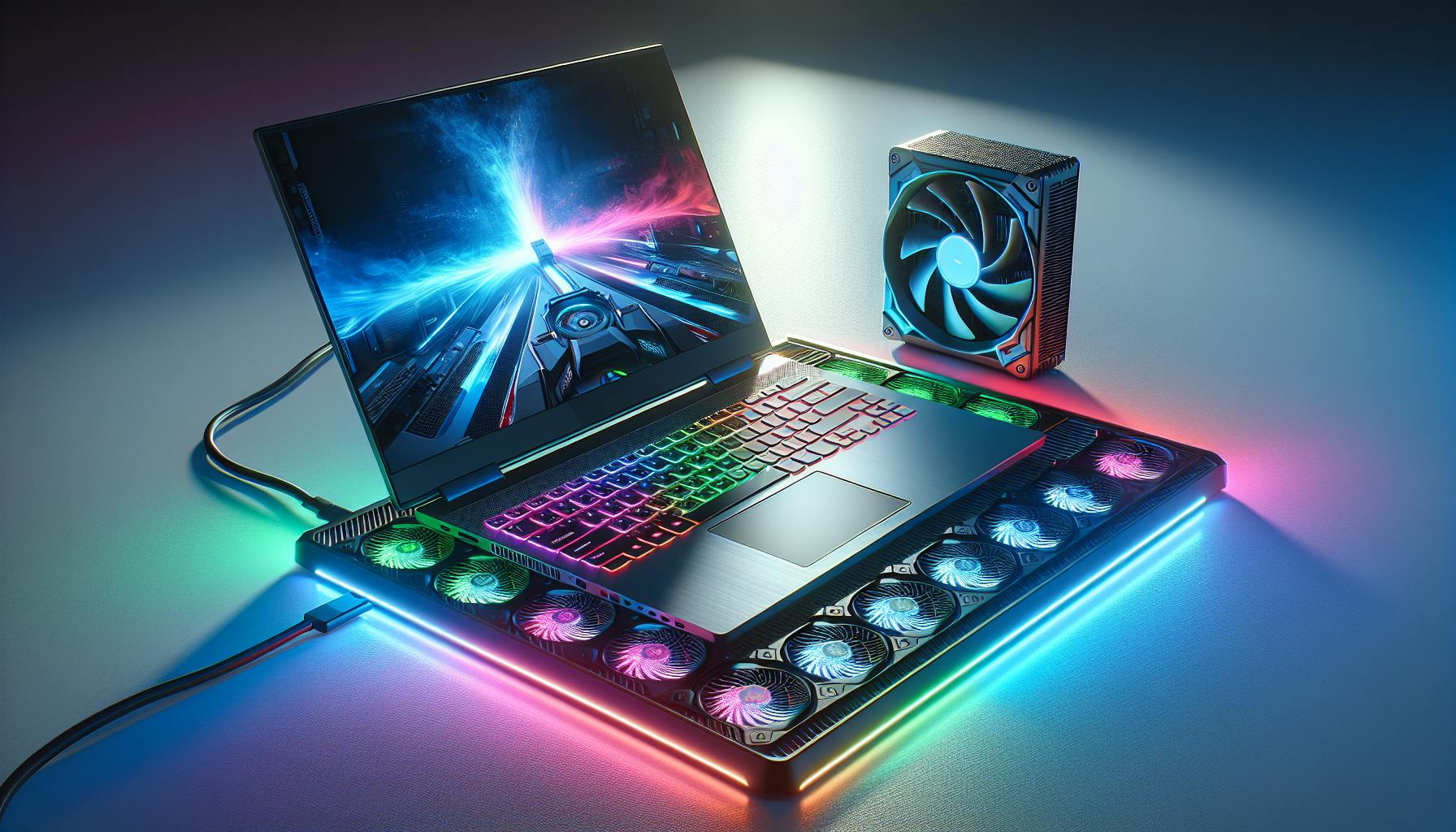New Technologies in Cooling Systems and Their Importance for Gaming Performance
Introduction to Cooling Systems and Their Importance for Gaming Performance
Gamers know that every frame counts. When you’re deep in the action, those split seconds can make all the difference between victory and defeat. But have you ever thought about what’s keeping your rig running smoothly? Enter cooling systems—the unsung heroes of gaming performance. These technologies are crucial for maintaining optimal temperatures, ensuring that your hardware operates at peak efficiency.
As graphics get more demanding and games become increasingly complex, traditional methods just don’t cut it anymore. New technologies are stepping up to meet these challenges head-on. Whether you’re a casual player or a competitive esports enthusiast, understanding how cooling impacts your setup is essential for getting the best experience possible.
Let’s dive into the exciting world of cooling systems and explore why they matter so much to gamers everywhere—especially here in London, where tech-savvy enthusiasts at Geeks Callout seek cutting-edge solutions!
Traditional Cooling Methods vs New Technologies
Traditional cooling methods, like air coolers and heatsinks, have been reliable for decades. These systems use metal components to dissipate heat passively. They’re often affordable and easy to maintain.
However, as gaming technology advances, their limitations become apparent. High-performance CPUs and GPUs generate significant heat during intense gameplay sessions. This can lead to thermal throttling, affecting performance.
New technologies are emerging that challenge these old methods. Liquid cooling systems offer enhanced efficiency by circulating coolant through a closed loop. They absorb heat more effectively than traditional solutions.
Moreover, innovative fan designs in air-blown cooling are improving airflow dynamics significantly. Fans can now adapt their speed based on real-time temperature readings.
Gamers want reliability paired with performance enhancement as hardware evolves rapidly. The demand for better cooling options is pushing manufacturers toward the latest advancements in technology.
Liquid Cooling Systems: Pros and Cons
Liquid cooling systems have gained popularity among gamers for their efficient heat dissipation. These solutions circulate coolant through tubes and blocks, drawing heat away from critical components like CPUs and GPUs.
One of the standout advantages is performance. Liquid cooling often results in lower temperatures compared to air-based methods, allowing for better overclocking potential. Gamers appreciate this boost during intense gaming sessions.
However, these systems come with drawbacks. Installation can be complex, requiring a fair amount of technical know-how. Additionally, there’s always the risk of leaks that could damage sensitive hardware.
The maintenance aspect shouldn’t be overlooked either; liquid coolants need periodic replacement to maintain efficiency. For tech enthusiasts willing to invest time and resources, liquid cooling can provide exceptional benefits but demands careful consideration as well.
Air-Blown Cooling Solutions: Advantages and Disadvantages
Air-blown cooling solutions have been popular for many gamers. They rely on fans to circulate air, removing heat from components effectively.
One significant advantage is their simplicity and affordability. Most gaming setups already include basic fans, making this method easy to implement without extra costs.
Moreover, these systems require minimal maintenance. Dusting off the fan every now and then suffices in most cases.
However, there are downsides. Air-blown cooling can struggle in high-performance scenarios where heat generation spikes significantly. Overclocked CPUs or GPUs may still run hot despite airflow efforts.
Noise is another factor to consider; powerful fans can create a distracting hum during intense gameplay sessions.
In terms of aesthetics, some gamers may find standard air-cooled setups less visually appealing compared to liquid options with RGB lighting effects and sleek designs.
Hybrid Cooling Systems: The Best of Both Worlds
Hybrid cooling systems combine the strengths of both air and liquid cooling technologies. This innovative approach allows gamers to enjoy optimal performance while managing heat efficiently.
These systems often utilize liquid cooling for critical components, like CPUs and GPUs. This helps dissipate heat faster than traditional air methods alone. Meanwhile, fans circulate air within the case to ensure all parts remain at a stable temperature.
One significant advantage is versatility. Users can customize their setups based on gaming needs or ambient temperatures.
Moreover, hybrid solutions tend to be quieter than pure liquid options. The fans operate at lower speeds since they’re not solely responsible for removing heat.
For serious gamers seeking high performance without compromising noise levels, hybrid systems are an attractive choice that addresses multiple concerns in one tidy package.
The Impact of Cooling Systems on Gaming Performance
Cooling systems play a crucial role in gaming performance. As games become more demanding, thermal management becomes essential.
When components like CPUs and GPUs overheat, they throttle down to prevent damage. This throttling results in lower frame rates and sluggish response times.
Efficient cooling helps maintain optimal operating temperatures. Gamers can enjoy smooth gameplay without interruptions or lag spikes.
Advanced systems not only enhance performance but also extend the lifespan of hardware. Reducing wear and tear promotes longevity for expensive components.
Moreover, quieter cooling solutions improve the overall gaming experience by minimizing distracting noise during intense sessions.
As gamers seek higher refresh rates and resolutions, investing in top-notch cooling technology is no longer optional; it’s a necessity for true performance enthusiasts. For more insights and discussions about cooling innovations, don’t forget to check out Geeks Callout!
Future Possibilities and Innovations in Cooling Technology
The landscape of cooling technology is evolving rapidly. Researchers are exploring advanced materials that can enhance heat dissipation, such as graphene and carbon nanotubes. These materials promise to revolutionize the efficiency of cooling systems.
Another exciting development is the potential for phase-change cooling solutions. By using substances that change state at specific temperatures, these systems could absorb significant amounts of heat without requiring bulky components.
Artificial intelligence also plays a role in future innovations. Smart algorithms will optimize airflow and temperature management based on real-time data from gaming hardware.
Eco-friendly options are gaining traction. Companies are looking into sustainable refrigerants and energy-efficient designs to minimize environmental impact while maintaining top-tier performance for gamers everywhere. The fusion of creativity, science, and technology shows immense promise for what lies ahead in the realm of cooling solutions.
Conclusion
As gaming technology continues to advance, the demands on cooling systems grow more intense. Gamers are always looking for ways to enhance their performance, and an efficient cooling solution is a key component of that equation. Whether it’s through liquid cooling, air-blown methods, or hybrid options, each technology has its unique advantages and potential drawbacks.
With new innovations constantly emerging in the market, the future of cooling systems looks promising. As gamers push their hardware to its limits with demanding graphics and high-performance requirements, investing in advanced cooling solutions becomes not just beneficial but essential.
For those passionate about gaming—whether you’re a competitive player or simply enjoy immersive experiences—the right cooling system can make all the difference in maintaining optimal performance during long sessions. By understanding your options and knowing what works best for your setup, you can ensure that overheating does not stand in the way of achieving peak gameplay.
Embracing these technologies means embracing better performance and enhanced longevity for your equipment—a win-win situation for any gamer dedicated to improving their experience. Make informed choices when selecting your next gaming rig’s cooling system; after all, every detail counts when seeking out excellence in gameplay!






